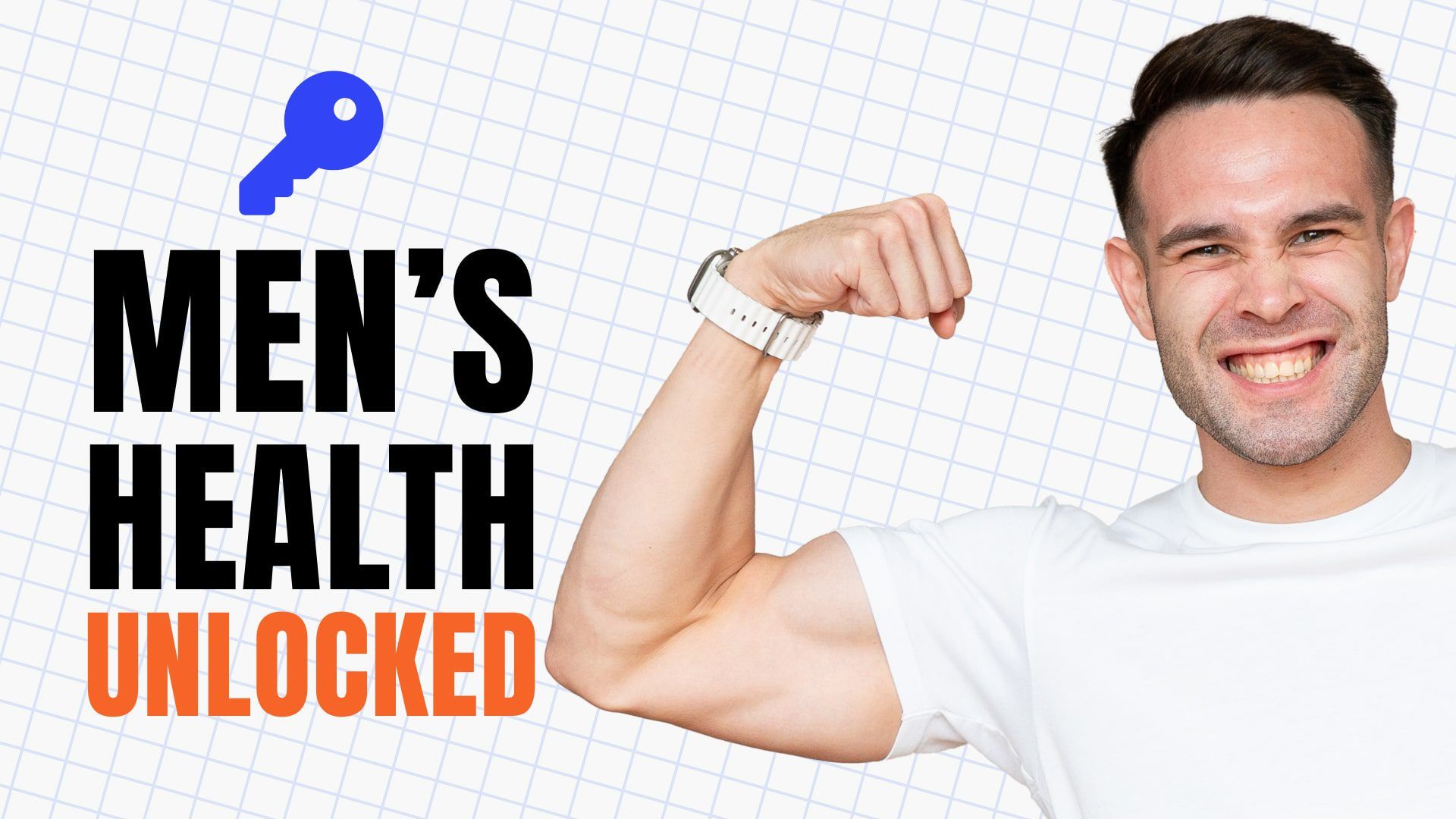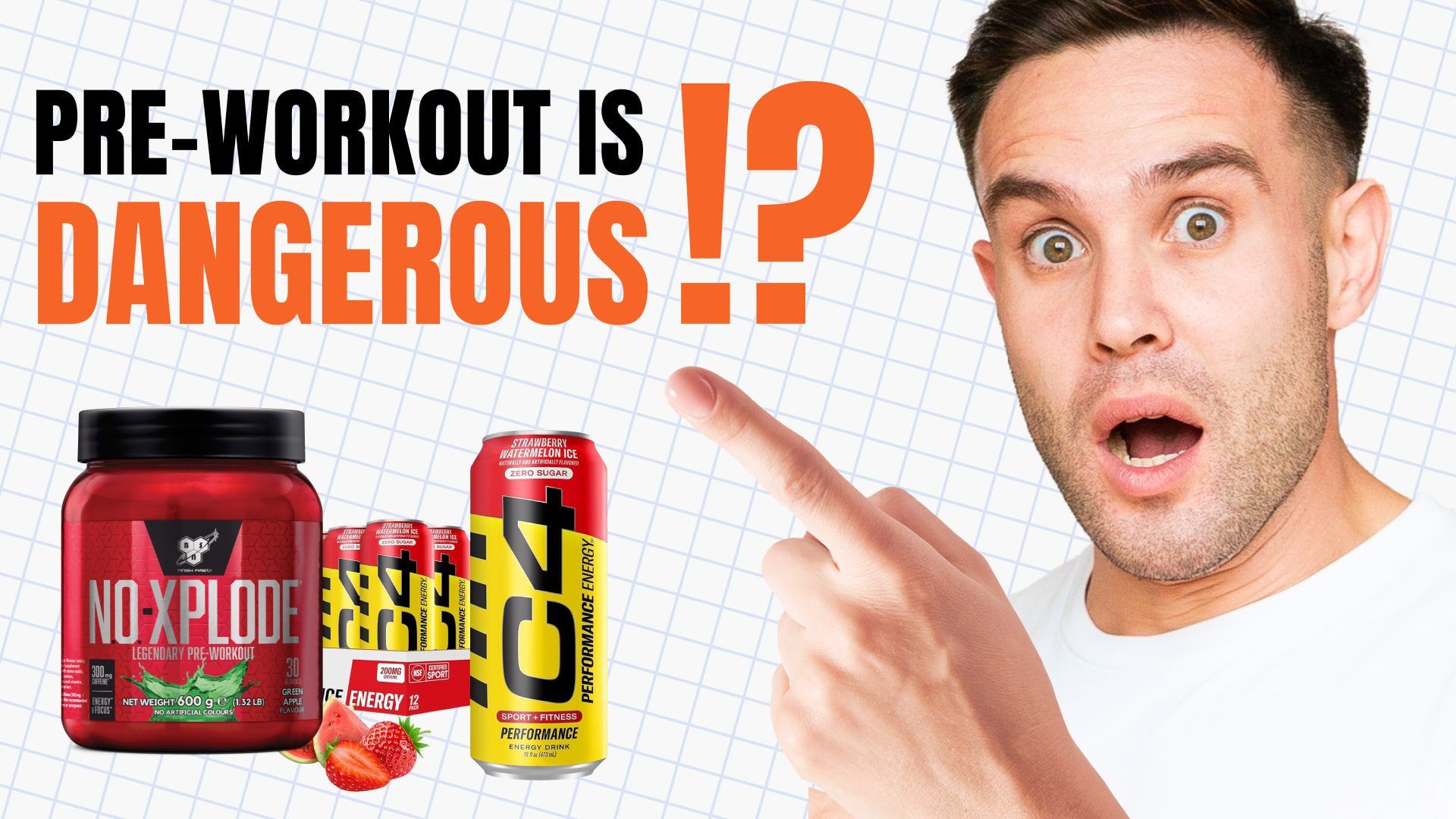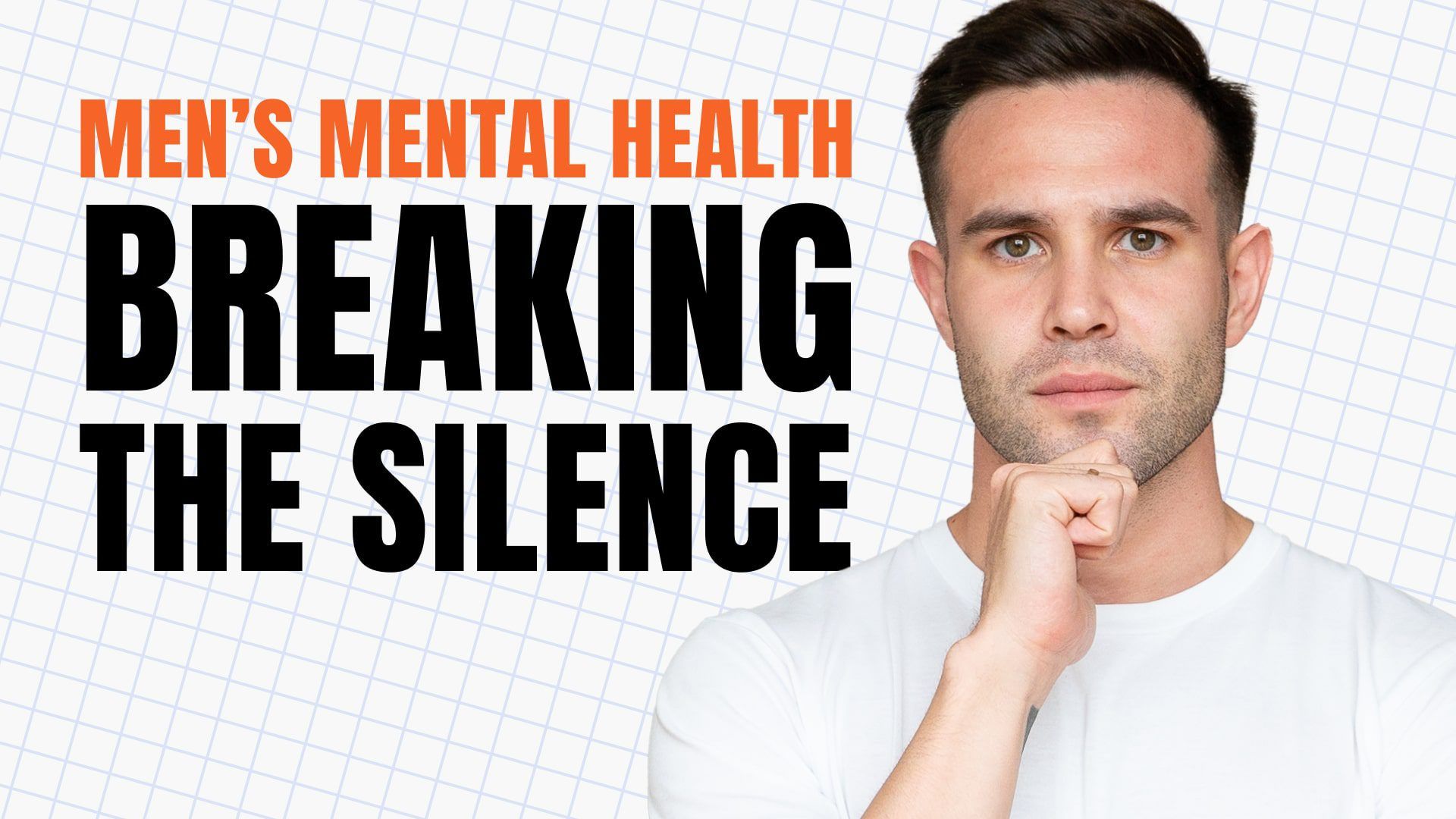Men’s Health 101: The Essential Guide to Physical Well-being

Table of contents
In this article, you will learn…
Your health is your most valuable asset, and taking care of it now will pay off in the long run.
This guide will walk you through the essential steps to improve your physical well-being, from building cardiovascular fitness and strength training to optimizing your diet and managing stress.
You’ll learn how to make small, consistent changes that lead to big results, backed by the latest science.
Don’t like to read? Watch the video!
Key Takeaways:
- Physical fitness significantly enhances cognitive functions such as memory, focus, and decision-making, contributing to better overall productivity.
- A balanced diet fuels both body and mind, providing sustained energy and supporting cognitive performance throughout the day.
- Quality sleep is crucial for maintaining mental clarity and emotional resilience, directly impacting your daily performance and productivity.
- Effective stress management prevents burnout and maintains focus, allowing you to perform at your best under pressure.
- Sexual health is integral to overall well-being and can indicate broader health issues.
- Weight management is essential for reducing the risk of chronic diseases and maintaining overall health.
- Time management strategies help optimize productivity without compromising your health, ensuring a balanced approach to achieving your goals.
The Building Blocks of Physical Health
Cardiovascular Fitness – Your Heart’s Best Friend
Your heart is the engine that keeps you going, and taking care of it should be a top priority. Cardiovascular fitness isn’t just for athletes; it’s about keeping your heart strong and your arteries clear, reducing the risk of heart disease, the leading cause of death in men.
Regular cardio exercise like brisk walking, cycling, or swimming can lower your risk of heart disease by up to 30%.
Start with something manageable, like 30 minutes of brisk walking five days a week. As you get more comfortable, try adding variety with activities like interval training or cycling.
I personally found that focusing on my heart health brought not just physical benefits but also a significant boost in mental clarity and energy levels.
It’s a small change with a big impact.
Strength Training – Building Muscle and Confidence
Strength training is crucial for more than just building muscle; it’s about improving your metabolism, boosting your confidence, and maintaining your health as you age.
Regular resistance training can prevent age-related muscle loss (sarcopenia), improve bone density, and reduce your risk of injuries.
You don’t need to hit the gym every day to see benefits. Start with bodyweight exercises like push-ups, squats, and lunges, which you can do at home.
Over time, incorporate weights or resistance bands to increase the intensity.
Personally, starting with a simple routine at home, focusing on form and consistency, has become a cornerstone of my fitness journey.
The confidence and strength you gain from regular strength training extend far beyond the physical.
Key Tips:
- Regular Exercise: Incorporate both aerobic and strength training exercises into your routine.
- Consistency: Aim for at least 150 minutes of moderate exercise per week.
- Flexibility and Mobility: Don’t neglect stretching and mobility exercises to improve range of motion and prevent injuries.
- Active Lifestyle: Incorporate more physical activity into your daily life, such as walking or taking the stairs.
Nutrition – Fueling Your Body the Right Way
The Power of a Balanced Diet
Your diet is the fuel that powers your body, and what you eat directly impacts your health and performance.
A balanced diet is essential for maintaining energy levels, supporting your immune system, and preventing chronic diseases.
Focus on nutrient-rich foods like whole grains, lean proteins, and a variety of fruits and vegetables. Also, don’t forget about probiotics and fibre.
Making small dietary changes, such as replacing processed snacks with fresh fruits or nuts, can significantly improve your energy levels and overall health.
For instance, a day that includes oatmeal with berries for breakfast, a salad with lean protein for lunch, and grilled fish with vegetables for dinner provides a balanced intake of essential nutrients.
Protein – The Building Block of Life
Protein plays a vital role in repairing tissues, building muscle, and supporting your immune system. It’s not just for bodybuilders; everyone needs adequate protein to maintain health, especially as we age. Aim for about 0.8 grams per kilogram of body weight, or more if you’re active.
Good sources of protein include eggs, chicken, fish, beans, and lentils. Starting your day with a protein-rich breakfast, like eggs or a smoothie, keeps you full and energized until lunch. Incorporating protein into every meal helps maintain muscle mass, supports recovery, and keeps you feeling satisfied throughout the day.
Key Tips:
- Balanced Diet: Focus on a variety of nutrient-dense foods including fruits, vegetables, lean proteins, and whole grains.
- Portion Control: Be mindful of portion sizes to avoid overeating.
- Hydration: Drink plenty of water throughout the day to support digestion and metabolism.
- Meal Planning: Prepare meals in advance to ensure a balanced diet and avoid unhealthy choices.
Monitoring Your Health – Key Metrics to Watch
Blood Pressure – Keep It in Check
Blood pressure is one of the most important indicators of your overall health. High blood pressure, often called the “silent killer,” can lead to serious issues like heart disease and stroke if left unchecked. Unfortunately, it usually has no symptoms, so regular monitoring is crucial.
Maintaining healthy blood pressure involves a combination of diet, exercise, and stress management.
Reducing sodium intake, increasing potassium-rich foods like bananas and spinach, and engaging in regular physical activity can all help keep your blood pressure within a healthy range.
Using a home blood pressure monitor and tracking your readings can give you insights into how your lifestyle choices are affecting your health.
Personally, I find that staying on top of my blood pressure helps me feel more in control of my overall health.
Cholesterol Levels – Balancing the Good and the Bad
Cholesterol often gets a bad rap, but it’s important to understand that not all cholesterol is harmful. Your body needs good cholesterol (HDL) to function properly, but too much bad cholesterol (LDL) can lead to plaque buildup in your arteries, increasing your risk of heart disease.
Managing cholesterol levels requires a combination of dietary changes and regular exercise. Foods like oats, nuts, and fatty fish can help lower LDL levels while increasing HDL. Regular aerobic exercise also plays a key role in managing cholesterol levels.
Personally, I’ve made it a habit to include more cholesterol-friendly foods in my diet, and I’ve noticed a significant improvement in my overall health markers.
Key Tips:
- Regular Check-Ups: Visit your healthcare provider for annual physicals and screenings.
- Blood Pressure: Monitor your blood pressure regularly to catch potential cardiovascular issues early.
- Blood Sugar: Keep track of blood sugar levels, especially if you have a family history of diabetes.
- Body Weight and Composition: Regularly check your weight and body fat percentage to ensure they remain within a healthy range.
The Importance of Sleep and Stress Management
Sleep – The Foundation of Recovery and Health
Sleep is often underestimated, but it’s one of the most crucial elements of maintaining good health. During sleep, your body repairs itself, your brain processes information, and your immune system strengthens. Lack of sleep can lead to a host of problems, including weakened immunity, weight gain, and increased stress levels.
Improving your sleep hygiene—by sticking to a regular sleep schedule, creating a comfortable sleep environment, and avoiding screens before bed—can greatly enhance your sleep quality. Aim for 7-9 hours of sleep each night.
I’ve found that sticking to a consistent sleep routine, even on weekends, makes a huge difference in how I feel and perform daily.
Stress Management – Finding Your Balance
Stress is an inevitable part of life, but how you manage it can make all the difference in your health. Chronic stress can lead to physical symptoms like headaches, high blood pressure, and a weakened immune system.
Finding effective ways to manage stress, such as practicing mindfulness, exercising, or engaging in hobbies, is essential for maintaining your physical and mental well-being.
Incorporating stress management techniques into your daily routine can help you stay balanced. Whether it’s through daily mindfulness exercises, regular physical activity, or simply taking time to relax and unwind, managing stress effectively is crucial for your long-term health.
I’ve incorporated these practices into my life, and they’ve helped me stay focused and calm, even during challenging times.
Key Tips:
- Sleep Routine: Establish a consistent sleep schedule and aim for 7-9 hours of sleep per night.
- Sleep Environment: Create a restful environment by keeping your bedroom dark, cool, and quiet.
- Stress Reduction: Practice relaxation techniques such as meditation, deep breathing, or yoga.
- Work-Life Balance: Set boundaries to prevent burnout and make time for activities you enjoy.
Sexual Health – A Pillar of Well-being
Sexual health is integral to your overall well-being. It encompasses more than just the absence of disease; it involves a positive approach to sexual relationships, respect, and safety.
Maintaining sexual health starts with understanding your body and addressing any concerns, such as erectile dysfunction or low libido, which can be early indicators of more serious health issues like cardiovascular disease or diabetes.
Key Tips:
- Regular Check-Ups: Regular screenings and check-ups are vital for early detection of issues.
- Healthy Lifestyle: A balanced diet, regular exercise, and sufficient sleep improve sexual function.
- Communication: Open dialogue with your partner and healthcare provider is crucial for maintaining sexual health.
- Stress Management: Managing stress through relaxation techniques can prevent sexual dysfunction.
Weight Management – Balancing Health and Performance
Effective weight management is crucial for reducing the risk of chronic diseases and ensuring overall health and performance.
This involves maintaining a balance between the calories consumed and the calories burned, which supports metabolic health and physical performance.
Key Tips:
- Balanced Diet: Focus on nutrient-dense foods that provide essential vitamins and minerals without excess calories.
- Regular Exercise: Combine aerobic exercises with strength training to build muscle and burn fat.
- Mindful Eating: Pay attention to hunger and fullness cues to avoid overeating.
- Set Realistic Goals: Aim for sustainable changes rather than quick fixes. Tracking progress and adjusting as necessary can lead to long-term success.
- Stay Hydrated: Adequate water intake supports metabolism and can help control appetite.
Frequently Asked Questions
What are some warning signs that I should get a health check-up sooner rather than later?
If you experience symptoms like unexplained weight loss, persistent fatigue, shortness of breath, chest pain, or unusual changes in bowel or bladder habits, it’s important to see a healthcare provider. These symptoms can be indicators of underlying health issues that require prompt attention.
Are there specific vitamins or supplements men should consider taking?
While a balanced diet is the best source of nutrients, some men may benefit from supplements like vitamin D, omega-3 fatty acids, or magnesium, depending on their dietary intake and health needs. It’s advisable to get your vitamin levels checked before starting supplements and consult with a healthcare provider to ensure you’re taking the right ones in the appropriate amounts.
How does alcohol consumption affect men’s health?
Moderate alcohol consumption may have some benefits, such as a reduced risk of heart disease, but it also carries risks. Excessive drinking can lead to liver disease, cardiovascular problems, and an increased risk of certain cancers. Men should aim to drink in moderation—no more than two drinks per day—and consider alcohol-free days each week to support overall health.
What role does mental health play in physical well-being?
Mental health is deeply interconnected with physical health. Chronic stress, anxiety, or depression can lead to physical symptoms like headaches, digestive issues, and even cardiovascular problems. It’s important to prioritize mental well-being through activities like mindfulness, therapy, and regular social interaction, as these practices can positively influence your physical health.
How can I maintain my health if I have a busy schedule?
Maintaining health with a busy schedule requires strategic planning and time management. Incorporate short, effective workouts like high-intensity interval training (HIIT) that can be done in 20-30 minutes. Prepare meals ahead of time to ensure you’re eating healthily during the week. Also, consider integrating physical activity into your daily routine, such as walking or cycling to work, to stay active without needing extra time.
What are some overlooked aspects of men’s health that I should pay attention to?
Some often-overlooked aspects include bone health, prostate health, and regular skin checks. Men are at risk of osteoporosis as they age, so maintaining bone health through calcium and vitamin D intake, along with weight-bearing exercises, is important. Regular prostate exams and skin checks for early detection of issues like prostate cancer or skin cancer are also crucial for long-term health.
How can I tell if I’m getting enough sleep?
If you wake up feeling refreshed, maintain consistent energy levels throughout the day, and don’t feel the need to nap, you’re likely getting enough sleep. Poor sleep quality may be indicated by difficulty waking up, feeling drowsy during the day, or needing to rely on caffeine to stay alert. If you’re experiencing these issues, it might be time to reassess your sleep habits or consult a healthcare professional.
What are some simple strategies to reduce my stress levels?
Simple strategies to reduce stress include regular physical activity, practicing mindfulness or meditation, and ensuring you have time for hobbies and social interactions. Even small changes like taking deep breaths, spending time in nature, or listening to music can have immediate effects on reducing stress levels. Developing a daily routine that includes these activities can help you manage stress more effectively over time.
Conclusion and Summary
Taking charge of your physical health is one of the most important decisions you can make. By focusing on cardiovascular fitness, strength training, proper nutrition, regular health monitoring, and stress management, you’re setting yourself up for a healthier, longer life. Remember, even small, consistent changes can lead to significant improvements in your well-being.
I encourage you to start implementing the tips from this guide today. Whether it’s adding more fruits and vegetables to your diet, going for a daily walk, or committing to a regular sleep schedule, every step you take brings you closer to better health.
If you have any questions or need further guidance, don’t hesitate to reach out. I’m here to help you on your journey to a healthier life. Visit my blog and social media channels for more guides, tools, and tips designed to support your physical and mental well-being.
Works Cited, Relevant Links, and Studies
- U.S. Department of Health and Human Services. (2018). Physical Activity Guidelines for Americans, 2nd edition. Health.gov.
- Lee, S., Bacha, F., Gungor, N., & Arslanian, S. A. (2012). The effects of aerobic versus resistance training on visceral and liver fat in obese adolescent boys: A randomized, controlled trial. JAMA Pediatrics, 166(8), 747-755.
- U.S. Department of Agriculture and U.S. Department of Health and Human Services. (2020). Dietary Guidelines for Americans, 2020-2025. 9th edition.
- Centers for Disease Control and Prevention. (2019). Hypertension prevalence and control among adults: United States, 2017–2018. National Center for Health Statistics Data Brief No. 364.
- American Heart Association. (2018). Cholesterol guidelines: A user-friendly guide.
- American Heart Association. (2019). The role of strength training on cardiovascular disease prevention. Journal of the American Heart Association, 8(14), e012993.
- National Institutes of Health. (2019). The impact of sleep on physical health. NIH News in Health.
- Lavie, C. J., Milani, R. V., & Ventura, H. O. (2009). Obesity and cardiovascular disease: Risk factor, paradox, and impact of weight loss. Circulation, 119(16), 2104-2112.
- Harvard Health Publishing. (2018). Regular exercise: Benefits beyond fitness. Harvard Medical School.
- Wolfe, R. R. (2015). The role of dietary protein in optimizing muscle mass, function, and health outcomes in older individuals. The American Journal of Clinical Nutrition, 101(6), 1260S-1269S.
This is a personal blog. I am not a doctor, fitness coach, nutritionist, or trained health professional. The information I share is based on my personal experience, self-research, and insights from working with health and wellness professionals. My content is for informational and entertainment purposes only and is not intended as health advice.
Always consult with your healthcare provider before making any significant changes to your health routines or treatments. I am not liable for any actions taken based on this information.
With that said, your well-being is my top priority. Stay healthy and take care!
Credits and Team















Leave a Reply